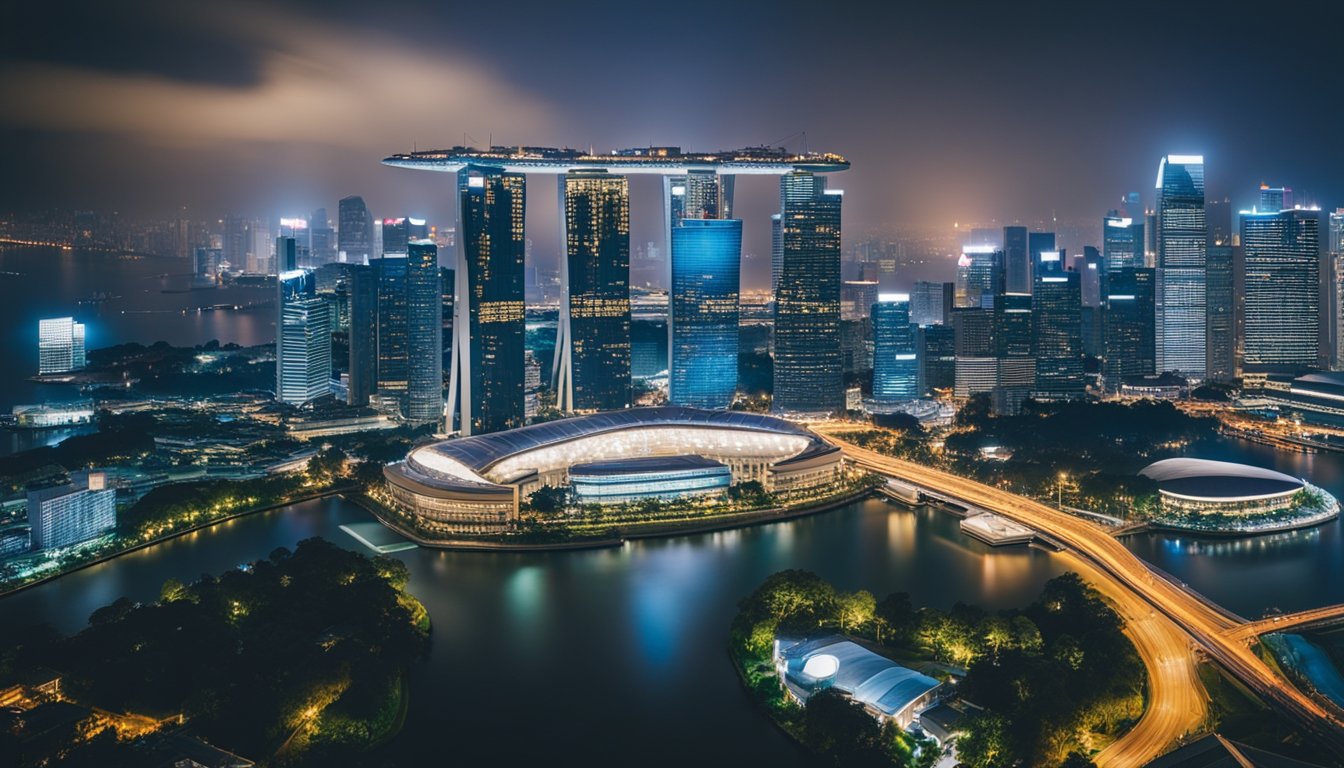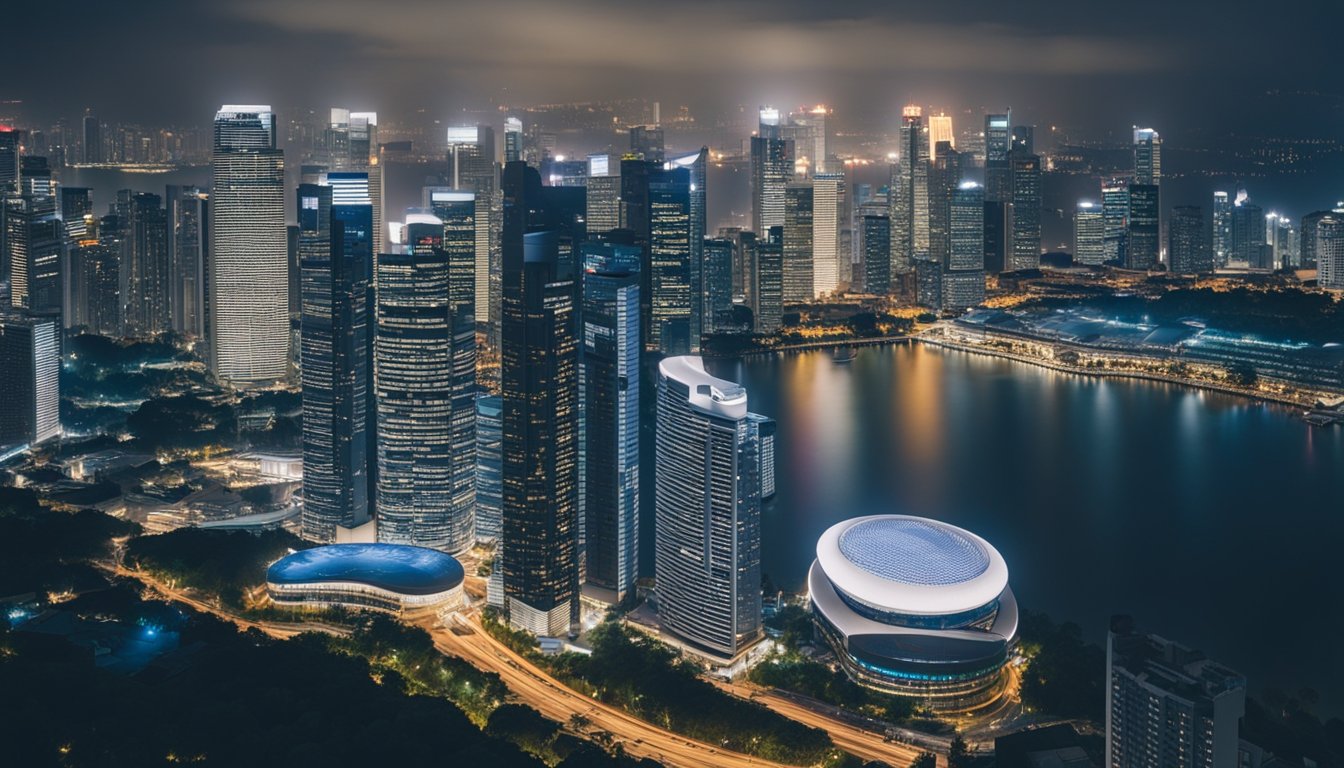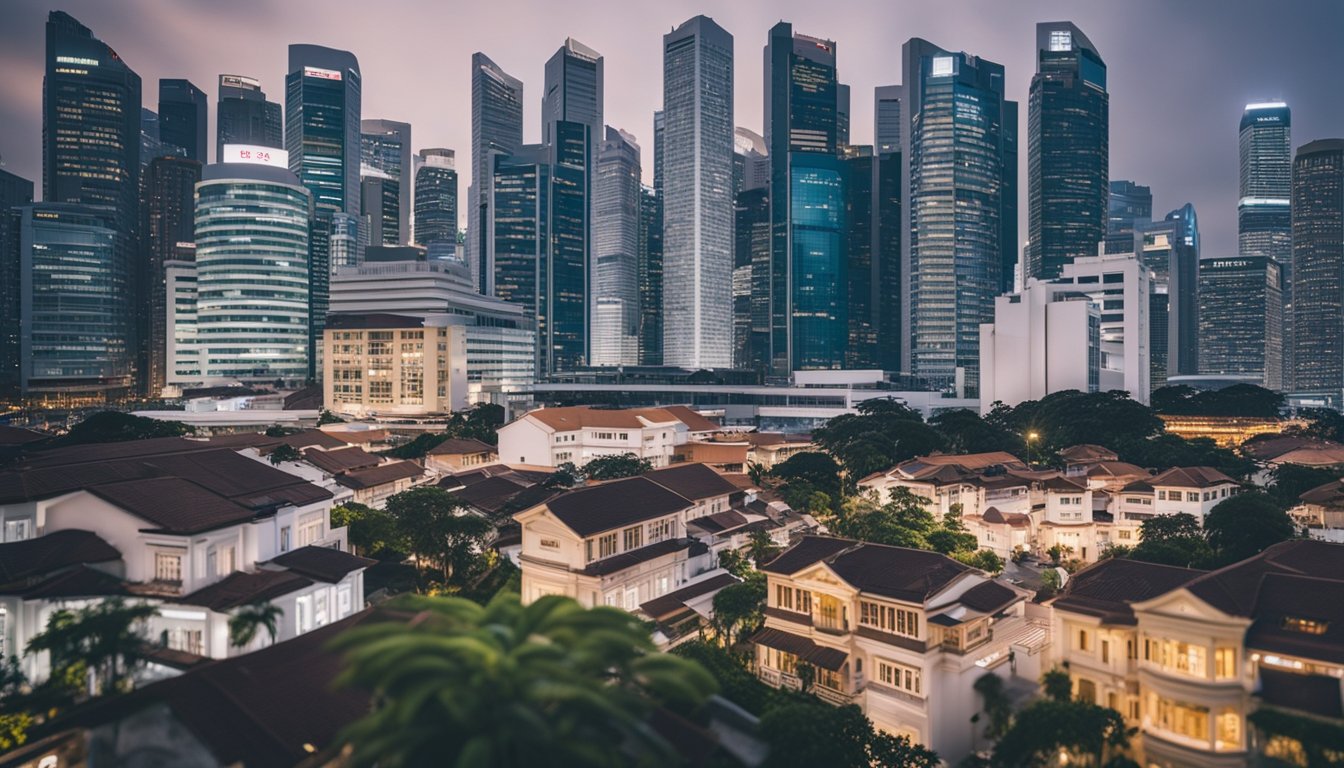If you’re thinking about buying a house in Singapore, you may be wondering if it’s a difficult process. With Singapore’s high property prices and strict eligibility criteria, it’s no surprise that many people find it challenging to purchase their first home. However, with the right knowledge and preparation, buying a house in Singapore can be a manageable and rewarding experience.

To understand the process of buying a house in Singapore, it’s essential to have a good understanding of Singapore’s property market. Singapore’s property market is heavily regulated, with measures in place to prevent speculation and ensure that property prices remain stable. As a result, buying a house in Singapore can be more challenging than in other countries, but it also means that the property market is more resilient to economic shocks.
When considering buying a house in Singapore, there are several financial considerations to keep in mind. From understanding the various fees and taxes involved in the home buying process to figuring out how much you can afford to borrow, it’s crucial to have a solid grasp of your financial situation before making any big decisions. By doing your research and seeking advice from experts, you can ensure that you’re making an informed decision that’s right for you.
Key Takeaways
- Singapore’s property market is heavily regulated, which can make buying a house more challenging than in other countries.
- Understanding the various fees and taxes involved in the home buying process is crucial to making an informed decision.
- By doing your research and seeking advice from experts, you can ensure that you’re making the right decision for your financial situation.
Understanding Singapore’s Property Market

If you are planning to buy a house in Singapore, it is essential to understand the property market. Here are some key things you need to know.
Types of Housing in Singapore
In Singapore, there are three main types of housing: HDB flats, executive condominiums (ECs), and private properties. HDB flats are public housing units that are subsidized by the government. ECs are a hybrid of public and private housing, and they are subject to certain eligibility conditions. Private properties include landed properties, condominiums, and apartments.
Property Ownership Regulations
The Singapore government has regulations in place to control property ownership. Singaporeans and Permanent Residents (PRs) are eligible to buy HDB flats and ECs. Foreigners can only buy private properties. To be eligible to buy public housing, you must form a family nucleus, which includes at least one Singaporean or PR. You must also meet the eligibility conditions, which include income ceilings, family nucleus, and essential occupier requirements.
Current Market Trends
The Singapore property market is dynamic and ever-changing. As of 2024, landlords and tenants are taking advantage of higher occupancy caps. The occupancy cap on unrelated tenants has been raised, and it is now possible to have eight unrelated tenants. Additionally, overall prices have increased by roughly 12% per square foot. Price movements correlate to volumes, subject to largely similar forces this year: a softer market in the Core Central Region (CCR) due to cooling measures, and an uptick in Rest of Central Region (RCR) prices due to a slate of recent new launches.
Impact of Government Policies
The Singapore government has implemented various policies to manage the property market. Property cooling measures such as Additional Buyer’s Stamp Duty (ABSD) and Seller’s Stamp Duty (SSD) are in place to curb speculation and prevent property prices from rising too quickly. CPF Housing Grants are available to eligible buyers to help with the down payment and monthly installments.
Location and Its Influence on Prices
Location is a crucial factor that affects property prices. Properties located in prime areas such as the Central Business District (CBD) or Orchard Road are more expensive than those in the suburbs. When choosing a property, it is essential to consider factors such as proximity to amenities, transportation, and schools.
In conclusion, the Singapore property market is a dynamic and evolving landscape. Understanding the types of housing, property ownership regulations, current market trends, impact of government policies, and location’s influence on prices is crucial when buying a house in Singapore.
Financial Considerations for Prospective Buyers

If you are planning to buy a house in Singapore, there are several financial considerations you need to take into account. Here are some important factors to consider:
Understanding Mortgages and Loans
When you buy a house in Singapore, you will most likely need to take out a mortgage or a bank loan. It is important to understand the different types of loans available and their interest rates. You should also be aware of the Total Debt Servicing Ratio (TDSR), which limits the amount you can borrow based on your income.
The Role of CPF Savings in Home Purchases
Your CPF savings can be used to finance your home purchase in Singapore. However, there are limits to the amount you can withdraw, known as the Withdrawal Limit and Valuation Limit. It is important to understand these limits and how they affect your ability to purchase a home.
Calculating Downpayment and Total Costs
When buying a house in Singapore, you will need to pay a downpayment, which can be a significant amount. It is important to calculate your downpayment and total costs, including stamp duty, legal fees, and maintenance fees, to ensure that you can afford the home you want.
Assessing Affordability and Budgeting
Before buying a house in Singapore, it is important to assess your affordability and budget accordingly. You should consider factors such as your income, expenses, and other financial obligations. You can use online calculators to help you determine how much you can afford to spend on a home.
Insurance and Protection for Your Home
Homeownership comes with risks, such as damage from natural disasters or theft. It is important to protect your home with insurance and other forms of security. You should also consider setting up a trust to ensure that your home is passed down to your loved ones in the event of your death.
Overall, buying a house in Singapore requires careful financial planning and consideration. By understanding the different financial factors involved and taking steps to protect your investment, you can achieve your dream of homeownership.
The Home Buying Process in Singapore

Excited to buy your first home in Singapore? The home buying process can be a daunting task, but with the right information and preparation, it can be a smooth and exciting journey. Here’s what you need to know about the home buying process in Singapore.
Selecting the Right Property
The first step in buying a property in Singapore is to select the right property that suits your lifestyle and budget. Consider the location, proximity to amenities, and accessibility to public transportation. Private properties are generally more expensive than HDB flats, but they offer more privacy, facilities, and space.
Eligibility and Application for BTO and Resale Flats
If you are a Singapore citizen or a permanent resident, you are eligible to apply for a Built-to-Order (BTO) or resale HDB flat. BTO flats are new flats that are sold directly by HDB, while resale flats are sold by the owners. You can apply for a BTO flat through the HDB website, while resale flats can be found on property portals or through a property agent.
Navigating the Loan Application
Once you have selected your dream home, the next step is to apply for a home loan. You can choose to apply for a bank loan or an HDB loan, depending on your eligibility and preference. Bank loans offer more flexibility in terms of interest rates and loan tenures, while HDB loans have a fixed interest rate but come with certain restrictions.
The Importance of Home Valuation
Before finalising the purchase, it is important to get a home valuation to ensure that the property is worth the asking price. The valuation limit is the maximum amount that the bank will lend you based on the property’s value. You can engage a professional valuer or use online tools to get an estimate of the property’s value.
Finalising the Purchase and Moving In
Once the loan is approved and the valuation is satisfactory, you can finalise the purchase by signing the Option to Purchase (OTP) or Sale and Purchase Agreement (SPA). You will need to pay a deposit and stamp duties, which are calculated based on the property’s value and lease. After the completion of the transaction, you will need to adhere to the minimum occupation period and lock-in period before you can sell or rent out the property.
Buying a house in Singapore can be a challenging process, but with the right guidance and preparation, it can be an exciting and rewarding experience.
Alternative Options to Buying

If buying a house in Singapore seems too daunting, there are several alternative options that you can explore.
Exploring the Rental Market
Renting a property in Singapore is a popular alternative to buying. The rental market offers a wide range of options, from HDB flats to private apartments and condominiums. Renting can be a flexible option, allowing you to move to different areas of Singapore as your needs change. However, it is important to note that renting is not a long-term investment, and you will not have the same level of control over the property as you would if you owned it.
Considering Executive Condominiums
If you are looking for a more affordable option than private property in Singapore, you might consider an Executive Condominium (EC). ECs are a type of public-private hybrid housing that is available to Singaporeans and Permanent Residents. They offer many of the same amenities as private condominiums, but at a lower price point. However, there are strict eligibility criteria for ECs, and there are also restrictions on selling them in the first few years after purchase.
Investment Opportunities in Private Property
If you are interested in investing in property in Singapore, but buying a house is not an option for you, there are still opportunities to invest in private property. You can invest in private residential property through Real Estate Investment Trusts (REITs) or by purchasing shares in property development companies. These options allow you to invest in property without the upfront costs and responsibilities of owning a house.
Overall, there are several alternative options to buying a house in Singapore that you can consider. Whether you choose to rent, invest in private property, or explore other options, it is important to carefully consider your options and choose the one that best suits your needs and budget.
Challenges and Tips for Specific Buyer Groups

Are you a first-time buyer, a single or non-citizen, or an existing property owner looking to maximise your benefits? Here are some challenges and tips to help you navigate the Singapore property market.
Advice for First-Time Buyers
As a first-time buyer, you may face challenges such as eligibility criteria and affordability. To be eligible for a Housing and Development Board (HDB) flat, you must be a Singapore citizen or a permanent resident. However, if you are a foreigner, you can still buy private property in Singapore.
To help with affordability, you can apply for the CPF Housing Grant, which provides up to $160,000 for first-time buyers of new or resale HDB flats. You can also consider taking a home loan from a bank or a Housing Board.
Navigating the Market as a Single or Non-Citizen
If you are a single person or a non-citizen, you may face additional challenges when buying property in Singapore. For example, singles are only eligible to buy new HDB flats in non-mature estates, and non-citizens must pay an additional Buyer’s Stamp Duty (ABSD).
However, there are also benefits available to these groups. For example, singles can apply for the Enhanced CPF Housing Grant, which provides up to $80,000 for the purchase of a new or resale HDB flat. Non-citizens can also apply for the ABSD remission scheme if they meet certain criteria.
Maximising Benefits for Existing Property Owners
If you are an existing property owner looking to upgrade your home, you may face challenges such as the Additional Buyer’s Stamp Duty (ABSD) and loan restrictions.
To maximise your benefits, you can consider selling your existing property before buying a new one to avoid paying ABSD. You can also use your Central Provident Fund (CPF) Ordinary Account savings to pay for the downpayment and monthly instalments of your home loan. Additionally, you can explore refinancing options to potentially lower your interest rates and monthly payments.
Overall, buying a house in Singapore may come with its challenges, but with the right knowledge and resources, you can navigate the market and find your dream home.
Frequently Asked Questions

What’s the latest scoop on property purchase regulations for Singapore citizens and permanent residents?
As a Singapore citizen or permanent resident, you have the privilege of purchasing both public and private properties in Singapore. The government has implemented several regulations to ensure that the property market remains stable and affordable for homebuyers. For instance, there are restrictions on the number of properties you can own, and you must meet specific eligibility criteria to purchase certain types of properties. You can find more information on the latest regulations on the PropertyGuru website.
Can a solo adventurer take the plunge into homeownership in Singapore?
Yes, you can! As long as you meet the eligibility criteria and have the financial capability to purchase a property, you can take the plunge into homeownership in Singapore. However, it’s essential to note that purchasing a property is a significant financial commitment, and you should carefully consider your budget and long-term goals before making a decision.
What’s the minimum age for snagging a property in Singapore, and is it youth-friendly?
The minimum age for purchasing a property in Singapore is 21 years old. While this may seem like a high bar for younger individuals, it’s essential to note that the government has implemented several measures to make homeownership more accessible for young adults. For instance, the government has introduced various housing grants and schemes to help first-time homebuyers get a foot on the property ladder.
How hefty should your treasure chest be before embarking on a Singapore property quest?
The amount of money you need to purchase a property in Singapore varies depending on several factors, such as the type of property you’re interested in, its location, and your financial situation. Generally, you’ll need to have a substantial amount of savings to cover the down payment, stamp duty, and other fees associated with purchasing a property. You can find more information on the costs of purchasing a property in Singapore on the SingSaver website.
Is the year 2024 shaping up to be a stellar time to invest in a Singaporean abode?
While it’s impossible to predict the future of the property market, experts forecast that the Singapore property market will remain stable in 2024. The government has implemented several measures to ensure that the property market remains affordable and stable for homebuyers. However, it’s essential to note that purchasing a property is a long-term investment, and you should carefully consider your financial situation and long-term goals before making a decision.
What’s the typical timeline for securing a house in the Lion City from start to finish?
The timeline for securing a house in Singapore varies depending on several factors, such as the type of property you’re interested in, its location, and your financial situation. Generally, the process involves several stages, such as property search, property viewing, loan application, and property purchase. The entire process can take anywhere from a few weeks to several months. It’s essential to work with a reputable real estate agent and financial institution to ensure that the process goes smoothly.

